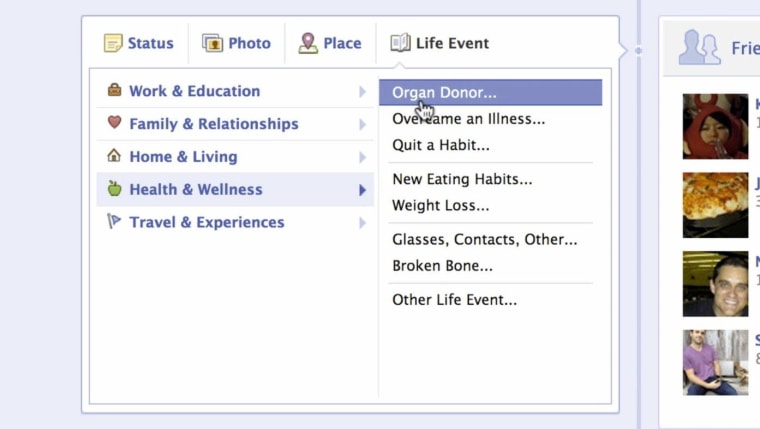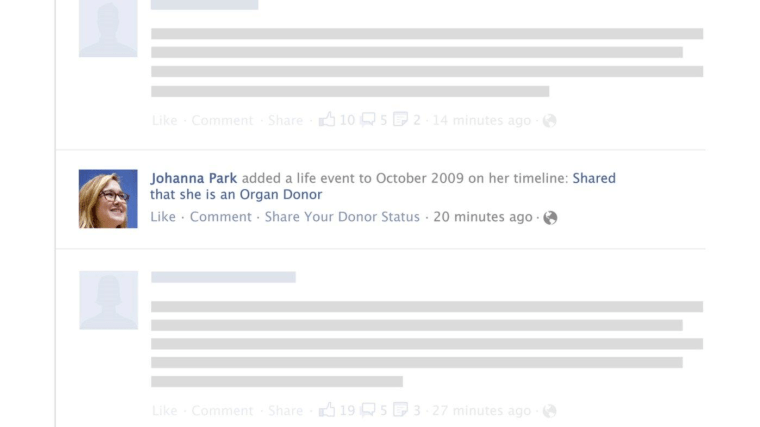
After successfully making the "relationship status" a significant issue in our lives, Facebook now brings attention (and peer pressure) to something else — our posthumous fate. On Tuesday, the social network announced that users may declare that they are registered organ donors by adding an "organ donor status" to their Timelines. While declaring your donor status on the social network isn't legally binding, Facebook hopes it will inspire people.
Facebook's latest feature is an attempt to save lives by raising "broader awareness about organ donation," according to a press release signed by Facebook CEO Mark Zuckerberg and COO Sheryl Sandberg. The two "believe that by simply telling people that you're an organ donor, the power of sharing and connection can play an important role."
In an interview with ABC’s Robin Roberts, Zuckerberg said his girlfriend, medical student Priscilla Chan, as well as his friendship with Apple co-founder Steve Jobs (whose life may have been extended thanks to a liver transplant) inspired him to add the organ donor status feature to Facebook.
While the plan might initially seem strange, it's quite clever once you think about it. Whether we love or hate Facebook, the social network plays a role in many of our lives. So when an issue is promoted on the site, we won't be able to escape it. Soon you'll notice the option to add your organ donation status when you edit your Timeline, you'll see your friends adding such statuses and you'll see links encouraging you to officially register as a donor.
Odds are, you'll idly click on something and learn a bit about organ donation. You might even decide to become a donor yourself — and then update your Facebook status, of course — which will add to the overall promotion of the issue.

If you are looking to add your organ donor status as soon as possible, here's what you have to do, according to Facebook's Help Center:
1. Click Life Event at the top of your timeline
2. Select Health & Wellness
3. Select Organ Donor
4. Select your audience and click Save
Just as you can hide your relationship status from some, most, or all people, you can also hide your organ donor status by editing your privacy settings.
And just as you can set a fake relationship status, you could set a fake organ donor status as well — though I don't know why you would — without any apparent legal consequences. Declaring that you're married on Facebook doesn't make a marriage license materialize, and declaring that you're an organ donor won't make your kidneys vanish one day. (Though family members could choose to take such a status to signify your final wishes, of course.)

Whether the awareness raised by Facebook (as well as the peer pressure it produces) will reduce the number of individuals who die while waiting for a transplant remains to be seen, but Dr. Andrew M. Cameron, a transplant surgeon at Johns Hopkins — who happened to discuss the issue with Sandberg during their 20th college reunion — sounds optimistic in a press release issued by the organization:
[Cameron] and a team at Johns Hopkins intend to carefully study the effect the Facebook effort has on organ donation rates. If it is successful, Cameron says he believes it could be used as a prototype for tackling other challenging public health problems.
"Getting people to donate their organs has been an intractable public health problem. It stands in contrast to other public health campaigns such as seat belts or drunk driving, which have had major impacts," he says. "If we succeed on Facebook with organ donation, it could be a model for how to use of-the-moment social media to solve important medical issues."
The folks from the United Network for Organ Sharing (UNOS) also reached out to explain that they're endorsing Facebook's organ donor status feature. "Social media outlets have a way of breaking down many of the traditional barriers we have in everyday conversation," said UNOS Executive Director Walter Graham. "Organ and tissue donation may not come up in the course of many discussions we have. But this is a unique opportunity for people to make their decision known and spur others to share their commitment to Donate Life."
Want more tech news, silly puns, or amusing links? You'll get plenty of all three if you keep up with Rosa Golijan, the writer of this post, by following her on Twitter, subscribing to her Facebook posts, or circling her on Google+.